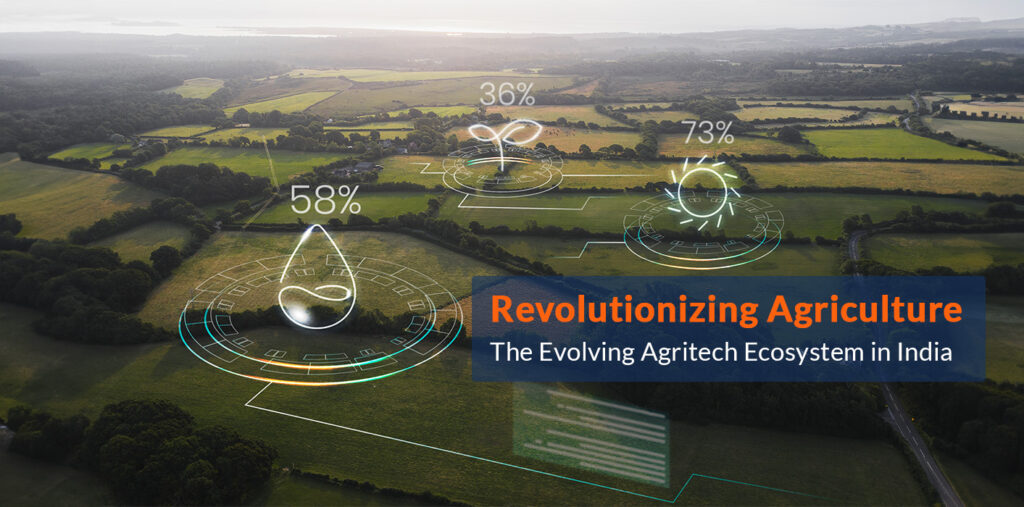Revolutionizing Agriculture: The Evolving Agritech Ecosystem in India
In recent years, the agriculture sector in India has witnessed a remarkable transformation, thanks to the advent of Agritech – the marriage of agriculture and technology. This dynamic intersection has not only increased the efficiency of farming practices but has also opened new avenues for sustainable and profitable agriculture. This blog aims to delve into the multifaceted Agritech ecosystem in India, exploring its role in transforming agriculture, the current landscape, its impact on the sector, government initiatives, investor considerations, and the exciting future that lies ahead.
The Role of Agtech in Transforming Indian Agriculture
Agriculture has long been the backbone of the Indian economy, employing a significant portion of the population. However, traditional farming practices faced challenges such as low productivity, resource inefficiency, and dependency on unpredictable weather patterns. The emergence of Agritech has played a pivotal role in addressing these issues.
Precision Farming and IoT
Precision farming, enabled by Internet of Things (IoT) devices and sensors, has empowered farmers to make data-driven decisions. These technologies provide real-time information on soil health, weather conditions, and crop growth, enabling farmers to optimize irrigation, fertilization, and pest control. This not only increases productivity but also reduces resource wastage.
Mechanization and Robotics
The integration of advanced machinery and robotics in agriculture has automated various labor-intensive tasks. From sowing seeds to harvesting crops, smart machines equipped with artificial intelligence (AI) and machine learning (ML) algorithms are enhancing efficiency, reducing labor costs, and minimizing the reliance on human labor.
Crop Monitoring and Management
Satellite imagery and remote sensing technologies are being leveraged for crop monitoring and management. These tools provide valuable insights into crop health, allowing farmers to identify potential issues early on and take corrective measures. This proactive approach minimizes crop losses and ensures better yields.
Agtech Landscape in India
The Agtech landscape in India is diverse, encompassing a wide range of solutions and services. Startups and established companies alike are contributing to the growth of this ecosystem.
Farm Management Software
Farm management software solutions have gained popularity, offering farmers digital platforms to plan, monitor, and analyze their agricultural activities. These tools provide features like crop planning, inventory management, and financial tracking, streamlining the entire farming process.
Market Linkages and Agri-Marketplaces
Agritech platforms facilitating direct linkages between farmers and consumers have emerged as game-changers. These digital marketplaces connect farmers with buyers, eliminating intermediaries and ensuring fair prices for agricultural produce. Additionally, they provide a transparent platform for transactions, benefiting both farmers and consumers.
Agri-Fintech
Financial technology (Fintech) has entered the agricultural sector, addressing the credit and financial needs of farmers. Agri-Fintech platforms provide farmers with access to credit, insurance, and other financial services, empowering them to make necessary investments in their farming activities.
Agtech’s Impact on Indian Agriculture
The impact of Agritech on Indian agriculture has been profound, touching various aspects of the sector.
Increased Productivity and Efficiency
Agritech solutions have led to a significant increase in productivity and operational efficiency. From optimized resource utilization to precise crop management, farmers are now equipped with the tools to enhance their output while minimizing wastage.
Sustainable Agriculture Practices
The adoption of precision farming techniques has contributed to more sustainable agriculture practices. By reducing the excessive use of water, fertilizers, and pesticides, farmers can mitigate environmental impact and create an eco-friendlier farming ecosystem.
Empowerment of Smallholder Farmers
Agritech has played a crucial role in empowering smallholder farmers by providing them with access to market information, financial services, and modern agricultural practices. This inclusion is narrowing the digital divide and creating a more equitable agricultural landscape.
Government Initiatives to Enable Agtech
Recognizing the potential of Agritech in transforming Indian agriculture, the government has introduced several initiatives to support and promote the adoption of technology in the sector.
Pradhan Mantri Kisan Samman Nidhi (PM-KISAN)
The PM-KISAN scheme aims to provide direct income support to small and marginal farmers. The government has also encouraged farmers to link their Aadhar cards with their PM-KISAN accounts, facilitating a seamless transition towards digital transactions and financial inclusion.
National e-Governance Plan in Agriculture (NeGPA)
The NeGPA focuses on creating a unified platform for various agricultural services, including market information, weather updates, and advisory services. This initiative promotes the use of technology to disseminate crucial information to farmers, enabling them to make informed decisions.
Kisan Credit Card (KCC) and Digital Payments
The government has actively promoted the use of Kisan Credit Cards, providing farmers with a financial tool to access credit for their agricultural needs. Additionally, the push towards digital payments has streamlined financial transactions in the agricultural sector, reducing dependence on cash.
Investor Considerations
As Agritech gains traction in India, investors are increasingly looking at opportunities within this sector. Several factors make Agritech an attractive investment proposition.
Growing Market Potential
The vast agricultural landscape in India provides a significant market for Agritech solutions. With a large number of smallholder farmers seeking improved productivity and efficiency, there is substantial potential for the growth of Agritech startups and services.
Government Support and Policies
Government initiatives and policies supporting the adoption of technology in agriculture create a conducive environment for investors. With financial incentives and regulatory backing, the risk associated with Agritech investments is mitigated, making it an appealing sector for funding.
Innovation and Technology Integration
Investors are attracted to Agritech due to the continuous innovation and integration of cutting-edge technologies in the sector. Startups offering novel solutions, such as AI-driven farm management or blockchain-enabled supply chain tracking, are particularly appealing to investors seeking high-tech and scalable opportunities.
The Future of Agtech in Indian Agriculture
Looking ahead, the future of Agritech in Indian agriculture holds immense promise. Several trends and developments are expected to shape the trajectory of this dynamic ecosystem.
Artificial Intelligence and Machine Learning
The role of AI and ML in agriculture is expected to grow, with predictive analytics, crop forecasting, and disease detection becoming more sophisticated. These technologies will empower farmers to make data-driven decisions, optimize resource allocation, and maximize yields.
Blockchain for Supply Chain Transparency
Blockchain technology is poised to revolutionize the supply chain in agriculture, providing transparency and traceability. This can be particularly beneficial in ensuring the authenticity of organic produce, preventing fraud, and building trust between farmers and consumers.
Agri-robotics and Automation
Advancements in robotics and automation are expected to bring about a significant shift in farm operations. From autonomous tractors to robotic harvesters, the integration of smart machines will continue to enhance efficiency and reduce the reliance on manual labor.
Climate-smart Agriculture
Given the increasing impact of climate change on agriculture, the focus on climate-smart agriculture will intensify. Agritech solutions that help farmers adapt to changing climatic conditions, optimize water usage, and mitigate environmental impact will become essential for sustainable farming.
Conclusion
The Agritech ecosystem in India is at the forefront of transforming traditional agriculture into a technologically advanced and sustainable industry. With the support of government initiatives, increasing investor interest, and the continuous integration of cutting-edge technologies, the future of Agritech in Indian agriculture looks promising. As the sector evolves, it is essential for stakeholders – farmers, entrepreneurs, investors, and policymakers – to collaborate and drive innovations that can further enhance the resilience, productivity, and sustainability of Indian agriculture. The journey towards a technologically empowered agricultural landscape is well underway, and the possibilities for growth and positive impact are limitless.








